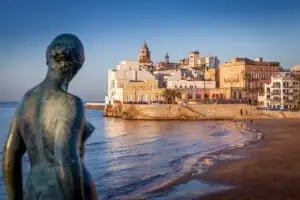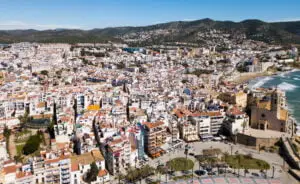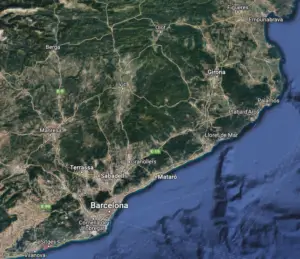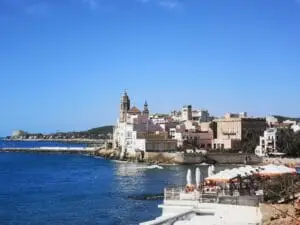Part of our regular series of round ups of Sitges news, Catalonia news and Spain news that you may have missed, with links to the original articles. Our focus is on news of interest to the international community.
Sitges News
The Sitges Carnival is almost upon us and, quite rightly, gets coverage across the media. This year, there will be the usual festivities, including the fancy dress bed race (see photo above by Catherine Hart) and the various processions (see our guide to the programme here). But there is one thing that will be used less than before: glitter. As reported across the web, including at timeout.es, the EU has banned the sale of glitter to restrict the use of intentionally added microplastics, meaning that carnival participants are only allowed to use existing stocks until they run out. One person who doesn’t need glitter to stand out: The Queen of the Carnival. Actually, there are two, the younger one (scroll to 25:37 here to see Txell Hernández being chosen this year) and the adult one, who in 2024, as reported by Eix Diari, is the delectable Mimi Chateau.
In other news, elespañol.com reports that the Urb. Terramar, Sitges home of Barcelona football player Jules Koundé was recently targeted for a burglary whilst he was playing against Villareal. Meanwhile, Cronicalglobal.es reports on the tragic events which occured on C/Santiago Rusiñol in mid January, where several people were injured and the father of a Sitges town councillor died in a housefire. And the townhall announced that Sitges is one of 202 Catalan municipalities that are subject to emergency drought restrictions from February 1st. A commission has been set up to manage water consumption in the town, and a regenerated water plant will soon be built, with a budget of €1 million from the EU. In addition, the town plans to desalinate the water wells that used to supply water to the town, but became salinated due to their proximity to the sea (at Recta de la Mata)
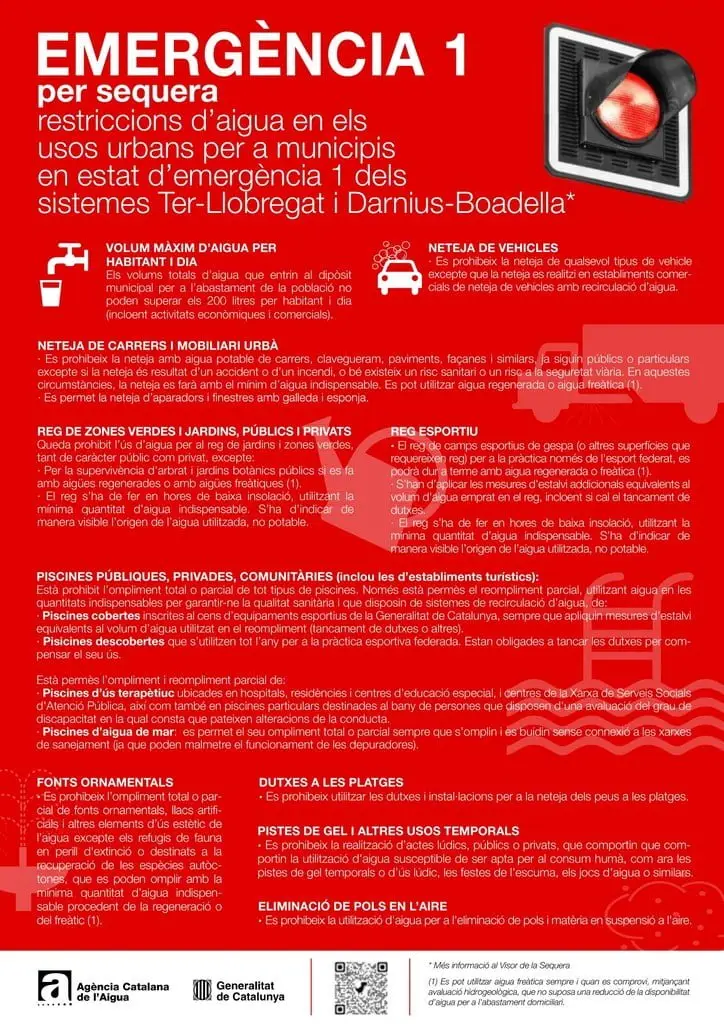
Also in Sitges, a new project to make the town more accessible has been announced by the town hall. The idea is to ensure that, for example, wheelchair users, can have much improved access to everything the town has to offer in the near future. In addition, there is currently a consultation underway, in the hope of incorporating the views of all Sitges residents in this project. Brandon Jones, the councillor for tourism, has strongly encouraged us all to give our views. To access the participatory process, go to the the Sitges City Council page here and then click on the participation portal https://participa311-sitges.diba.cat/ . The survey can also be done directly through the Participa 311 platform. The results of this study will help the Sitges Tourism strategy to be the best it can be!
Good news for car owners in Sitges has also been announced by the town hall: if you are a private individual and your car is registered in Sitges (and doesn’t have any outstanding fines) you no longer need to apply for a resident’s badge in order to park in blue or green zones, as it will be automatically recognised. In perhaps not such great news, the town hall additonally announced that green and blue zones will be expanded in the town in the first quarter of this year, although green zones are likely to continue to be free for cars registered as belonging to residents in the town, and blue zones will continue to offer heavy discounts for residents.
Catalonia News
Much of the recent news coverage about Catalonia has also focused on the state of emergency declared due to the drought, with The Guardian reporting that the area’s reserves have fallen below 16% and that in some areas it hasn’t rained for 3 years. The BBC, meanwhile, reports that Barcelona is considering importing water by ship, whilst elperiodico.com says it may come from desalination plants in Valencia. Perhaps the most, ahem, original take on the subject came from Madrid president Isabel Ayuso, who linked the drought to the closure of bullrings (as reported in eldiario.es). According to the article, Ayuso said that when an area closes bullrings, this leads to drought and excessive political control, and to a lack of prosperity and freedom. Hopefully (and despite the ban on bullrings) some rain is on the way very soon though, as The Olive Press reports.
Meanwhile, animanaturalis reports that the political debate on banning the correbous in Catalonia has just begun. Distinct from bull fights in bullrings, the correbous are festivals where bulls run in the street (like the running of the bulls in Pamplona) and the debate is considering any festival where bulls or other animals are treated with cruelty.
Elsewhere, dw.com reports on the trial of former Barcelona and Brazil football star Dani Alves, who has been in custody for over a year on charges of sexually assaulting a woman in a nightclub in December 2022. Alves faces up to 15 years in prison if convicted.
Also on the subject of Catalonia, a number of media outlets, including themayor.eu, report on the anti smartphone initiative in Catalan schools. They are now banned in all primary schools and must be switched off at all times in secondary schools, unless the teacher wants to use them in class. The initiative, as many people know already, began with a whatsapp group in Barcelona, created by parents who didn’t want their children and teenagers to have smartphones, but felt pressured by other children (and indeed by teachers who use them in class) to get one. Catalonia now joins countries such as France, Italy and Finland which have similar initiatives in place.

The ongoing Catalan separatist issue remains in the news too. If you’ve read our previous roundups, you’ll know that the Socialist government of Pedro Sanchez had proposed an amnesty for those involved in the 2017 independence referendum which Spain declared as illegal. Former Catalan president Carles Puigdemont is still in exile following his daring escape from Spain after the event, whilst nine other members of his government were imprisoned until they were pardoned by Spain’s government in 2021. The proposed amnesty is the subject of fierce opposition outside Catalonia, particularly on the part of the right wing Vox and Partido Popular parties. All the same, the bill was expected to pass, until a Catalan separatist party joined Vox and the PP in voting against it. As reported by the BBC, this was due to the bill not going far enough to protect people such as Carles Puigdemont from possible future terrorism charges. The bill now goes back to a parliamentary commission for revision, and must be re-submitted to congress within a month.
Meanwhile, thecorner.eu reports that Catalonia received the most tourists in Spain in 2023. The numbers were much higher than the previous years, and slightly up on pre-covid levels. Behind those numbers, however, British and German tourists have not yet recuperated pre-covid levels, although this is compensated by a large rise in tourists from the United States. Not all visitors from the US are welcome though, it seems: El Pais reports that two US Spies have been expelled from Spain for infiltrating the secret service.
Spain News
As far as Spain news is concerned, the Daily Express reports on the record numbers of bars, cafés and restaurants that have closed across the country, citing rising costs and the unprecedented lockdown and temporary closure of businesses as reasons for the phenomenon. 7825 shut down in 2022 alone. The previously unheard of lockdown policy, which was particularly rigid in Spain, has also been cited as one of the causes of a shocking doubling of mental health problems amongst Spain’s young people, as reported by Christian Network News. Meanwhile, euronews asks why Spain is struggling with increasing unemployment, and cites the highly regulated labour market as one possible reason. Despite Spain’s problems in this regard, the steady flow of undocumented migrants continues, with Reuters reporting that the numbers reaching the Canary Islands in fragile boats increased by over 1000% in January.
On the other hand, the Socialist government has announced that glasses and contact lenses will soon be free of charge for certain groups (and free dental care will be expanded), financed by the country’s social security system, as reported in Surinenglish.com.
Meanwhile, euractiv.com reports that Spain’s minimum wage will be increased by 5%, in what the government decribed as a powerfully feminist policy.
Such government largesse must be financed by taxes. For this reason perhaps, crypto.news reports that the Ministry of Finance in Spain is targetting owners of crypto and NFTs with new tax reforms. Warnings to residents who failed to declare their cryptocurrencies also more than doubled from 150,000 in 2022 to 325,000 in 2023.
Elsewhere, politico reports on the escalating tomato war between France and Spain. French farmers have complained that their Spanish counterparts are allowed to use pesticides that are banned in France, and use ‘fake bio’ stickers, and are therefore undercutting them. French politicians have waded in, declaring Spanish tomatoes to be ‘inedible’. Spanish leader Pedro Sanchez claims Spanish tomatoes are simply superior, and that his country employs innovative, high tech methods to produce them more economically. Perhaps MareNostrum 5, the new world class supercomputer recently unveiled in Barcelona has played a part?
There is even more controversy elsewhere. As reported by El Mundo, In Seville, a poster promoting Easter has been heavily criticised by ultra conservatives for making Jesus far too sexy, or even too ‘camp’. The artist claims he used his son as his model, and it’s not his fault if his son happens to be very attractive.
And absolutely deserving of controversy is the expat who left a dog to starve in a storage room in Marbella, as reported by The Olive Press. Somehow, thank goodness, the dog managed to survive for three months without food or water.

Finally, if you are looking to spend time exploring other parts of Spain, The Sun has identified one of the most beautiful small villages in Spain. Parauta, in the Sierra de las Nieves, is of Moorish origin and was one of the top 5 villages selected by Los Pueblos Más Bonitos de España.
On the same subject, Euronews has joined many other media outlets in praising the virtues of Spain’s green north west for a summer holiday. From gastronomy to surfing, and pilgrim routes to sleepy fishing villages, their article gives an overview of some of the treasures awaiting you there.
Don't Miss
Sitges for English Speakers exists to help people from all over the world to enjoy Sitges and to feel more included in this wonderful part of the world.
We do this by using English to provide you with information on:
- Events taking place in Sitges that you can filter by child friendly or English Spoken
- Businesses in Sitges, arranged by category, that you can filter by ‘Recommended by our members’ and more.
- Restaurants in Sitges, where you can filter to see which are recommended by our members, or which ones our members say are dog friendly, romantic, have a great menu del día or more!
- Comprehensive guides, including on buying property in Sitges, getting official documents, or getting medical/emergency care
- News roundups in English and features on places to go or things to do, as well as an overview of annual events in Sitges
We hope you enjoy our site and we look forward to seeing you here again soon. You can also add your voice by joining our private Facebook community, or get updates on news and events by liking our public Facebook page, or subscribing for email updates.






